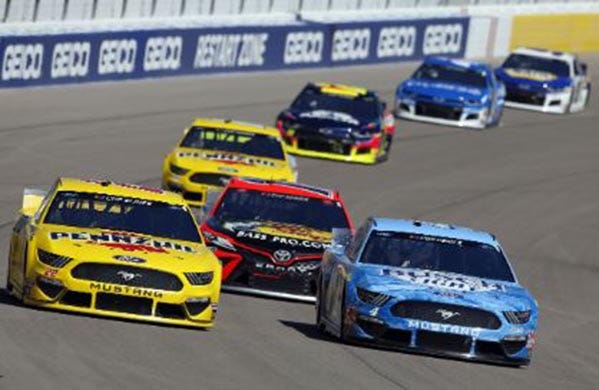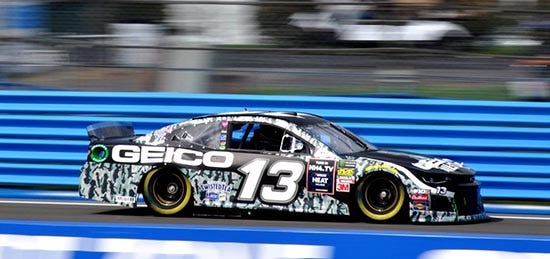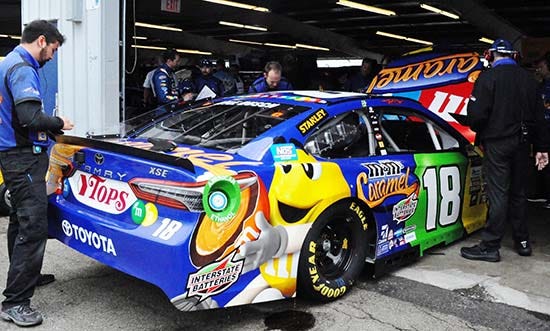NASCAR: Big Money, Big concerns, Big Decisions
New $7.7-billion TV deal, charters and sponsor deals headline 2024 plus who owns the charter, anyway?
From: Collector Car/Greg Zyla’s Racing Briefcase/Opinion
By Greg Zyla
I’ve received several letters from readers as to what’s up for 2024 when it comes to NASCAR. I’ll let the latest driver and team announcement news to those who devour the NASCAR YouTube videos and printed word, and instead share some of the off-track business news that many times is just as exciting as the actual races.
First, Sponsorship or lack thereof
I’ve read many articles discussing NASCAR major sponsorship continually losing Fortune 500 backing. I can quickly recall some of the major sponsors that have left NASCAR in the past 20 years including Kellogg’s, Caterpillar, Subway, Dollar General, Farmers, GoDaddy, Home Depot, Lowe’s, M&M Mars, and UPS. I could keep going but you get the idea.
The late, legendary “Dean of Motorsports Journalism” Chris Economaki told me back in the 1990s his concern about Cup racing and sponsors, noting that NASCAR Cup teams were turning into what he termed “racing charity cases” and were becoming completely reliant on sponsor money infusions to keep going.
Further, today’s top tier, season long major sponsor deals cost in the $25-million range, proving the Economaki fears have materialized. Unfortunately, there just aren’t many season long, major money clients left.
Here in 2024, Cup is a rich person’s sport for either the economic elite or those successful “charity case” owners that Economaki feared would multiply. The teams are barely surviving, but too many of the bigger teams are finding their marketing squads spending more and more time seeking sponsor support, be it a one race or multi-race package.
Look for this type of “non full season” race car sponsorship to continue, and it’s a life saver for all the teams involved.
Second, the Charter/Franchise Mystery
At the end of 2024, NASCAR must address the ‘who really owns that charter/franchise” issue that has the team owners genuinely concerned for rightful reasons.
The conundrum? The team owners do not really own these charters, NASCAR does. Yes, that’s correct, even though these charters, which offer a guaranteed starting spot in every Cup race on the schedule, are allowed to be sold by teams for rumored $25- to $40-million and up.
When NASCAR established the 36 charter/franchise system in 2016, I was happy for the team owners that previously had nothing left when they decided to quit Cup racing. This was all-good in my opinion, as I was one of the first writers with PRI magazine in the late 1980s and then my columns in National Speed Sport News pushing for a franchise system.
These NASCAR charters (many still call them franchises) would protect the owners and escalate NASCAR to the likes of the NFL, MLB and NBA. If you owned a NASCAR franchise, all would be good.
Well, it didn’t necessarily turn out that way, and herein lies the problem. NASCAR owns the charters, not the team owner. The negative of this situation finds NASCAR being more a “guardian” in that you either operate successfully like a franchise owner should, or you don’t and are shut out of the game based on inferior performance.
Further, the only chance non-charter teams have to enter a Cup race lies in the four open positions of the still 40-car approved starting field. (Used to be 43). These non-franchise teams can try and make the race, but they are out there on their own and won’t share monies like the 36 charter teams do.
There are also other charter rules that allow team owners to sell, buy, and even lease a charter, but if you lease the charter, it must be returned to the lender at year’s end. Also, four car maximum charter ownership is still the norm.
Third, the Mega 2025 TV Deal
NASCAR recently announced a new, mammoth money, TV/Media Rights arrangement that will reshape the live broadcasting agreements from 2025 through 2031. This innovative seven-year deal consists of four major broadcast partners, including Fox, NBC, and new associates Amazon Prime and Warner Brothers Discovery, known as TNT Sports.
Existing longtime allies Fox and NBC will bookend the Cup season splitting the rights to 14 events each. This means the Fox/NBC associates lose 10 of the mid-season races to the new partners and new direction.
Enter the world of streaming and DTC (direct to consumer) marketing to NASCAR racing. Prime Video and TNT Sports will each split the 10 midseason races, with five to Prime and five to TNT. These exclusive rights include qualifying and practice for the season, excluding the Daytona 500, Busch Lite Clash and All-Star event.
Prime already experiences success with its Thursday Night Football, and regardless of viewer pushback, hopes are similar the NASCAR agreement will likewise prove worthy following some initial pushback from all the demographic age groups. For simplicity’s sake, if you want to watch Prime’s five Cup races in 2025, you must be a Prime Video subscriber which is automatic if you are an Amazon Prime member. (Yes, I am).
The TNT deal will simulcast races on TNT (which to me means FREE if you have the TNT channel) while also streaming on the B/R Sports Add-On of the Max channel.
Overall, this new media rights package is worth a whopping $7.7 billion, which equates to a 40-percent increase compared to its current deal that runs out at the end of this year. That’s $1.1 billion per year to divide up, and something that continues causing distress with the racing teams.
So, what’s the problem?
On the cusp of this gigantic media money announcement, all of the current Cup teams are unhappy with how the TV monies are split, and make it known they are looking for a better incentive deal for 2025. Many feel the revenue sharing program is faulty at best and will not allow for future growth under continually higher operating cost realities. (Yep, called inflation).
Currently, the monies split goes like this: 60% to the track, 30% to the teams, and 10% to NASCAR. Most Cup fans are aware that NASCAR owns many of the tracks where Cup teams’ race, with the late Bruton Smith’s company Speedway Motorsports owning eight tracks. Pocono, Indianapolis, and many of the road/street courses are independent.
Consequently, NASCAR is now facing some serious decision making. If NASCAR owns most of the tracks, this means they walk away with 70% of the media money, while the Cup teams are stuck at the current 30%.
When you take into consideration it costs nearly $15 million on average to own and operate a top Cup team, which includes everything from employee salaries, racecars, real estate, over the road expenses, employee benefits, healthcare, 401K, utilities and so on, a more reasonable split of the TV money becomes paramount to a team’s current and future success.
As for the charter/franchises, teams are so upset that NASCAR still officially “owns” these charters that many teams allegedly did not show up for a recent meeting to discuss the situation according to sources. Under the current charter rule, a charter can be pulled if a team underperforms for three years in a row, resulting in a killer blow to a team by effectively putting them out of business.
Could the most recent sale of B.J. McLeod’s Live Fast Racing team charter to Spire Motorsports for a rumored $40 million have happened had there not been a performance clause in the NASCAR charter commandments?
Let’s face it, McLeod’s team did poorly enough the last three years to perhaps have become the very first team to lose a NASCAR charter/franchise. Would NASCAR have done so? It doesn’t matter now but proves that with the “lose your charter” ability, NASCAR clearly owns these charters.
Now imagine the NFL telling the New York Jets or Las Vegas Raiders they are out of the NFL because they had three losing seasons in a row. To be fair, I understand some of NASCAR’s reasoning to owning and controlling the charters, with the “start and park days” a prime example. However, control like this hurts the charter/franchise effort in my opinion.
Summary
It's going to be a remarkably interesting 2024 for sure. NASCAR will decide about the charter “renewals” even though most charter teams are already operating like they own them anyway. Still, team owner anxieties exist, and, again in my opinion, NASCAR must give up the charter ownership 100% to the team, period.
Additionally, that old “but NASCAR only receives 10% of the TV monies” gets old when one again considers NASCAR owns the majority of Cup hosted tracks…which equates to a reoccurring 70% take home pay exercise in my book.
Finally, and perhaps most important, a better “anxiety reducer,” ala a minimum 35% to even 40% TV deal instead of 30% for 2025 would be most welcome.
Then, we’ll see how things go from there.
GEICO insurance was a NASCAR “premier partner sponsor” for the entire Cup series in 2020. The company also was a major sponsor of the Richard Childress No. 13, driven by his grandson Ty Dillon that year. He is shown in action at Watkins Glen. (Greg Zyla Photo)
Tops Supermarkets, with heavy exposure in New York and Pennsylvania, use NASCAR for strategic and geographical advantageous marketing. This photo was taken at the Watkins Glen, NY, event when Kyle Busch still drove for Joe Gibbs and Toyota. Since then, M&M Mars has left the sport as Busch’s major sponsor, although Tops Supermarkets still uses NASCAR racecars for its marketing efforts. (Dave Mareck photo)









